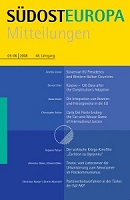Ostforscher-Erforscher
Researching the Researchers: The GDR's "West German Eastern Research Departments" and Their Perspective on the Nazi Past of Research into Southeast Europe in the Federal Republic
Author(s): Alexander KorbSubject(s): Politics / Political Sciences, History
Published by: Südosteuropa Gesellschaft e.V.
Keywords: Studies of Southeastern Europe in Germany;GDR
Summary/Abstract: The article looks at two academic units that operated in the GDR during the 1960s. Their taskwas to observe the activities of Eastern Europeanists in Western Germany. Traditionally, EastEuropean Studies (Ostforschung) in Germany was not simply an academic discipline, but wasembedded in a field of research institutes and political organisations that aimed at havinga strong influence on German politics and an even persuasive impact on Eastern Europe,specifically on the German minorities living there. The field was dominated by academics whohad been involved in Nazi mass crimes in Eastern Europe during WWII. In order to discreditWestern Germany, the GDR government claimed that it was basically a fascist state, and theNazi pasts of the Ostforscher were easy targets for the GDR campaigners.The article looks at how analysts in the GDR perceived the Munich-based Southeast EuropeAssociation (Südosteuropa-Gesellschaft, SOG). It highlights that they were surprisingly wellinformed and balanced in their assessment of the SOG. The article also makes the case that theresearchers in East-Berlin under the auspices of Rudi Goguel, a Nazi camp survivor, formed anearly and mostly over-looked core of Holocaust researchers – the first ones in the GDR thatdeserved that name.
Journal: Südosteuropa Mitteilungen
- Issue Year: 2016
- Issue No: 04
- Page Range: 80-102
- Page Count: 23
- Language: German
- Content File-PDF

